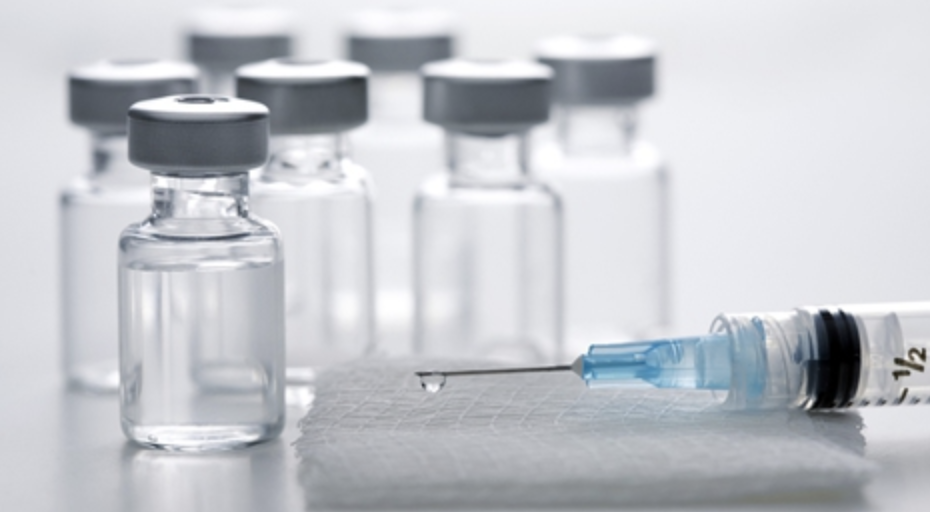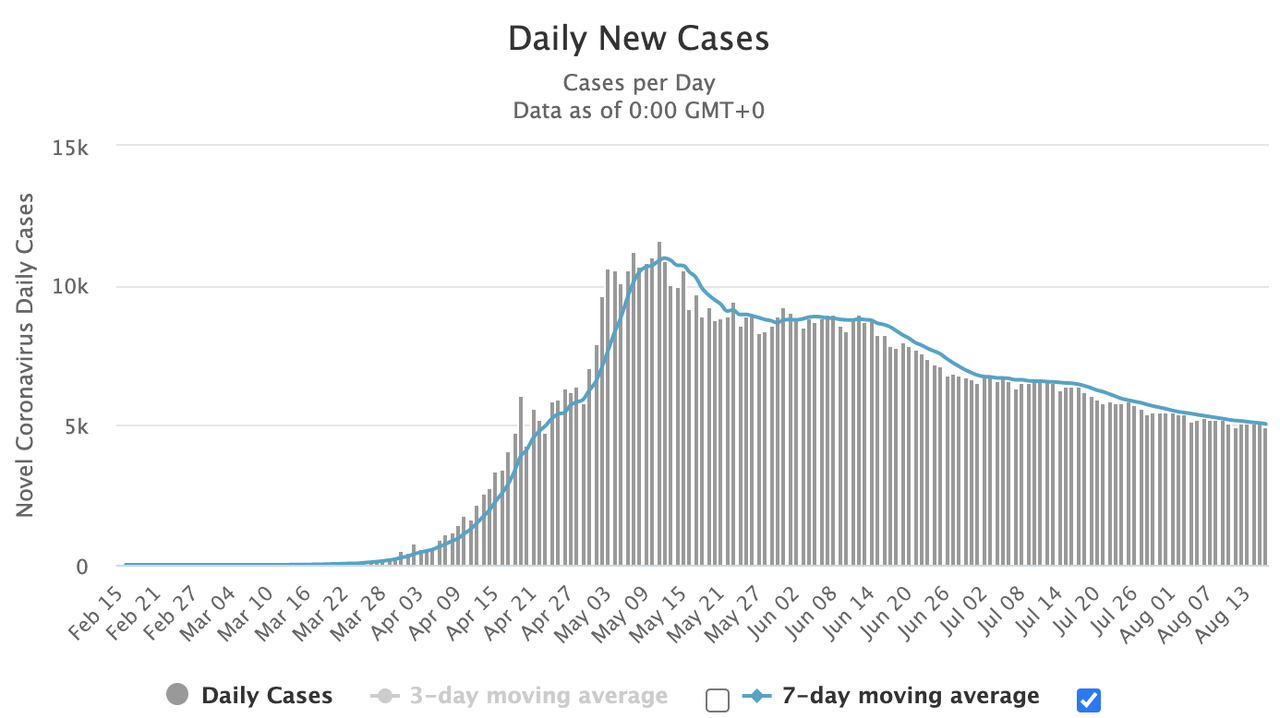Beijing Touts Major COVID Vaccine Milestone As China Plays 'Catch-Up' With Russia Tyler Durden Mon, 08/17/2020 - 21:30
As the Philippines, Brazil, India and dozens of other countries struggling under the economic strain of COVID-19 outbreaks turn to Russia as their new savior thanks to the Putin-approved (one of his daughters was allegedly "part of the experiment") vaccine, which, technically, won't be widely available until January.
But roughly two dozen countries are already queuing up, striking multimillion-dollar deals (much of which, we suspect, will be settled in rubles) and kissing the ring, granting Putin a popularity boost as he seeks to play up his government's progress in fighting the virus.
To be sure, Russia is still clocking more than 5,000 newly confirmed cases every day, though the rate at which new deaths are being reported has slowed (some have pointed to some kind of an official cover-up). The vaccine and its association with the respected Gamaleya Institute helped bolster Putin's credibility, and even bolstered the market's appetite for risk, providing a solid day's worth of grist for the market's insatiable appetite for vaccine-related headlines.
Apparently, Putin's showboating has inflamed President Xi's thirst for a similar victory to display before the world. Which brings us to a headline from today's "Global Times". Patent Affirms Efficacy Of Vaccine Developed By China.
The story, detailing the granting of the first patent for a domestically-developed COVID vaccine in China, claimed Chinese authorities had granted the first patent to one of the many candidates vying for approval in China (and doing so with the benefit of generous government subsidies, not unlike the US with "Project Warp Speed").
Chinese authorities have granted the first invention patent to a domestically developed COVID-19 vaccine candidate, which experts said demonstrates the vaccine's originality and creativity, and would enhance the international market's trust in Chinese-developed COVID-19 vaccines amid the US' groundless accusations of Chinese hackers trying to steal novel coronavirus data on treatments and vaccine development from them.
The vaccine is a recombinant adenovirus vaccine named Ad5-nCoV co-developed by Chinese biopharmaceutical firm CanSino Biologics Inc, one of the vaccine candidate's co-developers, with the other being a team led by Chinese military infectious disease expert Chen Wei.
The grant of the patent further confirmed the vaccine's efficacy and safety, and convincingly demonstrated the ownership of its intellectual property rights (IPR), CanSino said in a statement sent to the Global Times on Sunday.
Xu Xinming, a Beijing-based lawyer specializing in intellectual property rights, told the Global Times on Sunday that China has a comparatively strict and complete patent examination system, requiring a technology or product to be fundamentally different from existing similar technologies and products all over the world to be granted the patent.
"The grant of the patent demonstrates the vaccine's originality and creativity," Xu said, noting that CanSino is also probably applying for a patent with foreign authorities to protect its IPR during international cooperation.
An employee with the CanSino public relations department denied claims to the Global Times on Sunday that the grant of the patent had any relationship with the authorities' marketing process of the vaccine, noting that the two issues are under the supervision of two different systems.
As we've noted before, CanSino's vaccine is using an adenovirus vector similar to the Russian vaccine, and the Oxford/AstraZeneca candidate. Perhaps the most interesting aspect of the report was a section entitled 'Market confidence' offering some details from the patent application (which, of course, is in mandarin).
Read the excerpt below:
The patent clarified 14 claims for CanSino's IPR over the vaccine, including its nucleotide sequence, application purpose, preparation forms and methods, according to CanSino's statement.
According to CanSino, they applied for a patent with the National Intellectual Property Administration on March 18, three days after they launched phase one clinical trials on the candidate and received approval on August 11.
The phase III trial on the vaccine which will be conducted overseas is progressing smoothly, the company noted.
Results of the phase one and two trials were revealed as of July 20, showing a good safety profile and high levels of humoral and cellular immune responses.
CanSino has signed deals with Mexico to conduct late-stage clinical trials for COVID-19 vaccines, the Ministry of Foreign Affairs of Mexico said last week.
Saudi Arabian health officials also announced on August 9 to cooperate with phase III clinical trials on the vaccine, recruiting around 5,000 participants.
CanSino has also reportedly been in talks with Russia, Brazil and Chile to launch a Phase III trial on Ad5-nCOV.
Cooperation against vaccine nationalism
Amid media hype, the COVID-19 pandemic has created a risk of "vaccine nationalism," however global cooperation around vaccine R&D to solve the COVID-19 conundrum has not stopped.
All five types of COVID-19 vaccines in China are being developed under international cooperation with a list of countries including the UAE, Brazil, the UK, the US and Germany, media reported.
China and Russia have planned to collaborate on COVID-19 vaccine clinical trials, said Chinese top respiratory scientist Zhong Nanshan, a leading figure in the fight against COVID-19, at a recent academic exchange conference on China-Russia cooperation against the coronavirus held in South China's Guangdong Province.
Signs of cooperation seem to have emerged as early as January, media reported, as the Russian consulate in China's Guangzhou revealed in a statement on its website that "Russian and Chinese experts have begun developing a vaccine" and Beijing has handed over the genome of the virus to Moscow.
Experts said the move is part of China's promise to pitch into the global fight against the virus, adding that China and Russia have a clear basis for vaccine cooperation in resource sharing and mass production.
China and Russia can exchange data and techniques around vaccine R&D, given the second dose of Russia's newly approved world's first COVID-19 vaccine has almost the same mechanism with that of the China-developed adenovirus vector COVID-19 vaccine, Ad5-nCoV, according to Tao.
China may also be able to help Russia with mass production for its second dose of the vaccine if needed, considering China has relatively ample capacity for mass production, Tao said.
"The genetic sequence of viruses are very crucial in the development of vaccines, and sometimes can be even regarded as an intellectual property right," Yang Zhanqiu, deputy director of the pathogen biology department at Wuhan University, told the Global Times on Sunday. "The sharing and openness of gene sequences reflects China's willingness and confidence to work with others against the virus."
Potential cooperation between China and Russia would be a win-win one, and it will also help China develop a vaccine that can be adapted to a wider range of viral strains, said Yang.
US and Chinese medical institutions have been working together on vaccine development since the beginning of the year, a US vaccine scientist told the Xinhua News Agency on January 22.
Peter Hotez, professor and dean of the National School of Tropical Medicine at Baylor College of Medicine (BCM) in Houston, Texas, said his group is working with the Virology Center at Fudan University in Shanghai, China.
Hotez praised China's efforts in dealing with the epidemic, saying Chinese scientists have done an amazing job so far figuring out the transmission and working out quickly the isolation and sequencing of the virus, Xinhua reported.
Collaboration between US company Inovio Pharmaceuticals, Inc. and Beijing Advaccine Biotechnology Co. was approved in July to work jointly on advancement of the INO-4800 vaccine against coronavirus, and late-stage clinical trials have been ongoing, media reported. It is the world's first COVID-19 vaccine to be tested simultaneously in the US and China.
British multinational pharmaceutical company GlaxoSmithKline (GSK) is working with China's Xiamen Innovex on a recombinant protein-based coronavirus vaccine candidate to protect people from the novel coronavirus. GSK is eyeing boosting production of the candidate to a billion doses by 2021, according to media report.
Putin has already started his countdown clock, with an expected date of January for widespread availability of the Russian vaccine. We imagine similar announcements from CanSino, which has now apparently cemented its status as the most promising candidate in China.
https://ift.tt/2CzMksQ
from ZeroHedge News https://ift.tt/2CzMksQ
via IFTTT



0 comments
Post a Comment